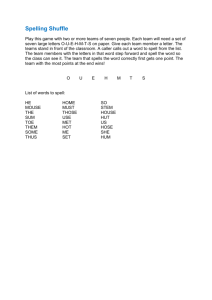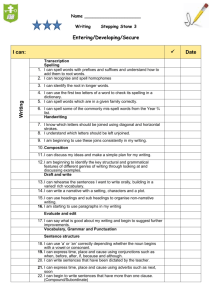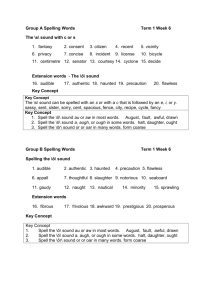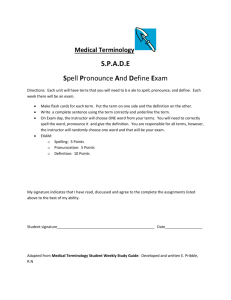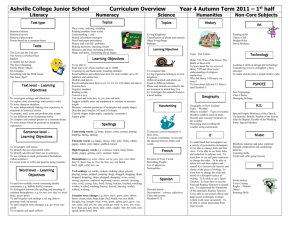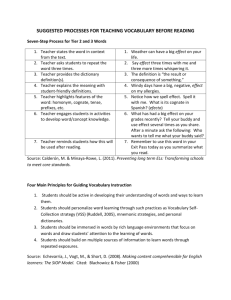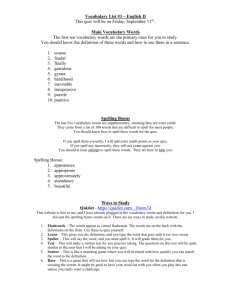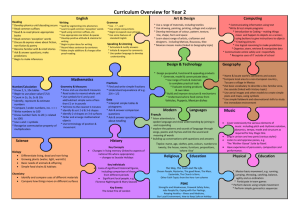Children in Year 3 during Term 1 should learn to spell words ending
advertisement
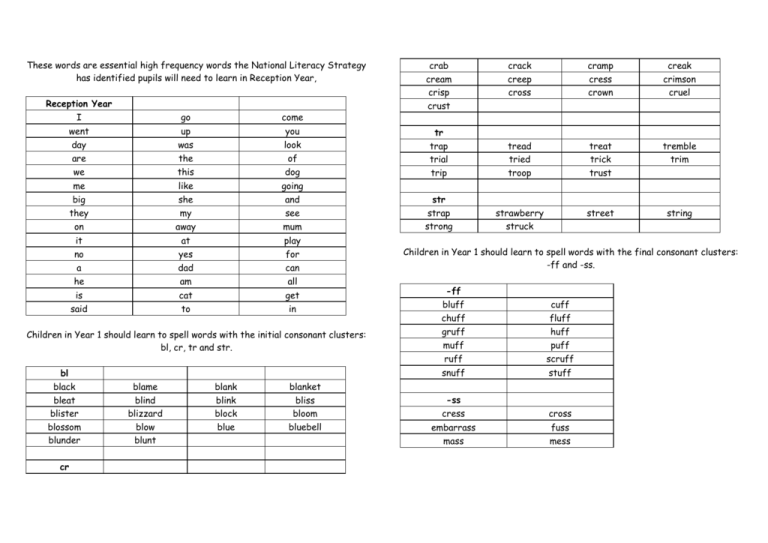
These words are essential high frequency words the National Literacy Strategy has identified pupils will need to learn in Reception Year, Reception Year I go come went up you day was look are the of we this dog me like going big she and they my see on away mum it at play no yes for a dad can he am all is cat get said to in Children in Year 1 should learn to spell words with the initial consonant clusters: bl, cr, tr and str. bl black bleat blister blossom blunder cr blame blind blizzard blow blunt blank blink block blue blanket bliss bloom bluebell crab cream crisp crust crack creep cross cramp cress crown creak crimson cruel tr trap trial trip tread tried troop treat trick trust tremble trim str strap strong strawberry struck street string Children in Year 1 should learn to spell words with the final consonant clusters: -ff and -ss. -ff bluff chuff gruff cuff fluff huff muff puff ruff scruff snuff stuff -ss cress cross embarrass fuss mass mess Children in Year 1 should learn to spell words with the final consonant clusters: -ck. -ck back black block brick buck check chick click clock crack deck dock duck fleck flick flock hack Jack kick lack lick lock luck mock muck neck nick pack peck pick pluck prick quack rack rock sack shock sick slack slick smack snack sneak sock speck spick stack stick stock struck stuck suck tack tick tock track trick tuck truck Children in Year 1 should learn to spell words with the final consonant clusters: -ng. -ng bang bung clang cling clung dung fang fling gang gong hang Hong Kong hung king King Kong long ping pong rang ring rung sang sing slang slung sprang spring sprung sting string strong sung swing Children in Year 1 should learn to spell words with the final consonant clusters: -ll. -ll ball bell bill call cell chill dwell fall fell fill frill grill hall hill Jill kill mill pill sell shell shrill skill small smell spill spell stall still tall tell thrill till wall well will yell Children in Year 1 should learn to spell words with the vowel clusters: oo (long sound as in soon). oo balloon boo boot coo cool coop moon moose noon pool roof room swoop tool troop too toot tooth droop root zoo food scoot fool school book goose shoot cook groove smooth look hoof snoop took hoop snooze loom soon loop spook loot spoon moo stool mood stoop Children in Year 1 should learn to spell words containing: ee. Children in Year 1 should learn to spell words ending: ing and ed (without changing spelling). ee ing and ed jeep need peep meet keep sweet ask enjoy help look pull deep feet weep jump greet sleep tweet spend wait walk steep street sweep watch rush march sheet creep feel melt shock snow crack snort see peel three shift heel bee kneel hand start smell tree wheel knee float seem hunt cheek free peek end need sort pick dress green seek queen kick week been leek show crash kill seen freeze screen talk bark thank breeze keen squeeze fuss cook seed sneeze weed geese speed cheese bleed speech greed teeth sleeve Children in Year 1 should learn to spell words ending: ai and ay. ai rain train pain sprain drain grain stain chain Spain vain main plain aim claim maid paid fail pail jail tail sail snail trail wail rail nail paint faint saint wait waist faith praise day way ay pay hay may ray play stay tray pray sway stray spray bay say These words are essential high frequency words the National Literacy Strategy has identified pupils will need to learn in Reception Year, Reception Year I go come went up you day was look are the of we this dog me like going big she and they my see on away mum it at play no yes for a dad can he am all is cat get said to in Children in Year 2 should learn to spell words containing: ow, ou and oa. ow ow cow pow now how wow down town clown drown crown brown frown gown owl scowl fowl howl growl crowd browse towel power tower shower snow slow crow grow blow throw glow row tow know bowl owe own ou round ground hound sound pound found mound bound could would should out stout spout shout loud cloud hour flour sour our mouse house ouch crouch couch pouch slouch south mouth bounce count blouse oat coat boat goat float throat trousers oa moat gloat stoat toast roast coast boast groan moan oak cloak croak soak coach poach loaf road hoax toad load soap foam Children in Year 2 should learn to spell words containing: ar. ar Children in Year 2 should learn to spell words containing: oi and oy. oi apart arch are oil coil foil ark arm army boil spoil toil art article bar join coin point bark barn burglar joint noise oink car card carnival voice choice doing carpet cart charge moist noise poison charm chart dark toilet disappointed dart department far farm garden hard oy harm harp jar boy toy coy large lark March joy enjoy destroy mark market pardon annoy royal loyal park part particularly oyster voyage employ party popular scarf shark sharp smart spark star starch start tart Children in Year 2 should learn to spell words containing: air, or and er. air air hair fair chair stair pair flair lair repair dairy downstairs hairy for sort port sport short torn corn horn born upstairs or worn pork fork cork stork storm form porch torch lord cord order sword more score snore store sore shore before poor door moor floor brother mother author er sister father boxer keeper cleaner player trainer speaker softer verse term her herb quicker duster winter monster voucher letter butter flower power trouser paper crisper herd fern germ perch kerb verb prayer cracker under shorter longer Children in Year 2 should learn to spell words containing: ur, aw and au. ur murder Saturday curse burglar Thursday burn return nurse turn disturb purse curl hurt adventure century spurt buried church burp burst court slurp capture creature during fur ourselves figure hour pleasure flour injured pressure fourth insurance purple purchase return surface surprise temperature yourself draw shawl saw jaw crawl law paw bawl straw claw dawn yawn away fawn prawn awful lawyer lawn awoke awake crawl current aw raw au cause pause naughty taught caught daughter sauce August autumn haunt aunt beautiful launch authority because author automobile caught daughter laugh restaurant dinosaur naughty exhaust fault saucer Children in Year 2 should learn to spell words containing: ch, wh and ph. ch Children in Year 2 should learn to spell compound words. compound words beach branch catch anybody breakfast chalkboard chair change charge churchyard cupboard downstairs chase check cheese dustbin everybody everybody cherry chew chicken everywhere football friendship children chocolate chop goalkeeper hairbrush headteacher church ditch kitchen herself himself milkman machines March matches newspaper paintbrush pancake ouch reach rich peanut playground playschool touch watch witch postbox rainbow snowball snowflake snowman someone somewhere strawberry suitcase anywhere wh everywhere meanwhile sunflower toothbrush toothpaste somewhere whale what upstairs weekend windmill whatever wheel when whenever where which while whisper whistle white who whole whose why ph dolphin elephant geography graph photograph physical telephone trophy Children in Year 2 during Term 3 should learn to spell words containing ea. makes the sound e breakfast health instead ready tread weather dead heather meadow steady treasure deaf heaven measure thread wealth makes the sound ee beach bean cheap dream bead beast clean each beak beat cream east easy freak heathen eat heap heave feast heat jeans lead leaf leak lean leap least leave meal mean neat peach read sea scream squeak stream team tweak wheat pea please real seal sneak steal tea tease weak peace reach reap seat speak steam teach treat weave makes the sound ay break great steak Children in Year 3 should learn to spell words ending in le. le able dimple pimple ample drizzle poodle angle fable prickle article fiddle puzzle battle example riddle Bible giggle sample bicycle grumble scribble bubble guzzle settle bundle handle single cable icicle simple cackle middle stable candle miracle tackle cattle needle temple chuckle noodle tickle circle obstacle trickle crumble particle uncle cubicle people wiggle dazzle pickle Children in Year 3 should learn to spell words with prefixes: de, dis, pre and re. de deactivate debug decamp deflate de-ice debate decaffeinated decode deform Demist debrief decant decompose defuse dis disadvantaged disappoint discount dishearten dislike displease disagree disconnect discourage dishonest disorderly disrepair disappear discomfort disembark disinfectant disown disrupt pre prearrange prefix prepay preset precaution premature prerecord prevent prediction prepare preschool previous re readjust reapply recharge redesign re-educate re-enter readmit rearrange recycle rediscover re-emerge re-examine reappear rebuild redecorate redraw re-enact Children in Year 3 should learn to spell words with prefixes: im and un. Children in Year 3 should learn to spell words ending in ing (with changed spellings). im take off e add ing imagination imitation immaculate immature immune impatience amazing caring coming driving hating imperfection impersonate impolite deciding impossible impractical improper hoping liking making raising riding smiling staring taking writing un unacceptable unaccompanied unadventurous unafraid unalterable unappealing unappetising unashamed unassisted unattractive unavailable double the last letter and add ing betting chatting clapping unavoidable fitting hopping planning running shopping unbreakable uncaring uncertain rubbing unclear uncontrollable uncooked shutting sitting slimming uncut undamaged undetected slipping tipping winning unforgettable unforgiving unfurnished swimming asking going enjoying ungrateful unheard unhurt uninvited unofficial unopened unpaid unplug unprepared unsafe unsatisfactory unsuccessful unwelcome simply add ing doing helping jumping leading looking meeting pulling saying seeing spending trying walking Children in Year 3 should learn to spell contractions. contractions I'm don't shan't she's they've haven't we'd hasn't they're I'd who's that's we're you've there'll Children in Year 3 should learn to spell superlatives and comparatives, ending in -er and -est. er est light lighter lightest full fuller fullest narrow narrower narrowest tall taller tallest long longer longest great greater greatest dark darker darkest smooth smoother smoothest fair fairer fairest round rounder roundest soft softer softest old older oldest young younger youngest sweet sweeter sweetest cold colder coldest high higher highest small smaller smallest neat neater neatest fast faster fastest slow slower slowest fat fatter fattest sad sadder saddest hot hotter hottest thin thinner thinnest big bigger biggest pale paler palest wide wider widest easy easier easiest tidy tidier tidiest heavy heavier heaviest happy happier happiest dry drier driest Children in Year 3 should learn to spell words with silent letters: w, k, g and b. k knack knife knit know knee knight knock knuckle kneel knickers knot b bomb crumb dumb numb tomb climb debt lamb plumber comb doubt limb thumb g gnat gnaw reign gnarled gnome gnash gnu w answer what whip whole wrapper wrestle wring write wrote sword wheel whisky why wreck wretch wrinkle written whack where who wrap wren wriggle wrist wrong l calf could salmon yolk calm folk should chalk half would h chemist rhubarb wheat whirl honest rhyme when rhino whale whine Children in Year 3 should learn the spelling rules to write plurals. races Plurals radios rockets roses sandwiches schools scissors shells ships shoes sisters songs sports stars stories supplies sweets taxes teachers teams themselves tigers toes trains tries trousers vegetables wheels windows wishes wolves writers dolls eggs enemies faces factories families feathers friends glasses groups houses jobs kisses knives ladies leaves letters lights lions machines matches monsters names parents parties pets picnics pictures pieces poems ponies potatoes puppies pyjamas questions activities adults adventures agencies animals apples arms authorities babies bags bananas bats beaches beans berries birds biscuits boats bones books bottles branches buildings bunnies bushes candles cards carrots cats coins countries cows crisps cups daughters dishes Children in Year 4 should learn to spell words with the suffixes: -ic, -ness, ship, -ary and -hood. Children in Year 4 should learn to spell words ending in 'ly' and other words ending in 'ly'. Attic ic basic electric probably Fantastic gigantic magic quietly recently safely Metric music picnic silently simply slowly Plastic public traffic softly suddenly truly Heroic comic static Ness Business happiness wilderness Ship Championship spaceship friendship Ary words ending in 'ly' properly quickly ugly unfortunately usually absolutely actually apparently badly carefully certainly clearly completely constantly cuddly curly daily definitely early easily especially exactly extremely family finally friendly generally happily hardly Dictionary February January immediately lately lonely Library necessary ordinary lovely luckily mainly Salary scary mostly nearly obviously only possibly Hood Motherhood childhood neighbourhood Children in Year 4 should learn to spell words with the suffix 'al'. animal al bilingual capital carnival criminal decimal educational final funeral general goal gradual hospital illegal individual local magical material medal medical national natural normal occasional original potential several personal real signal physical royal social special traditional Children in Year 4 should learn to spell words with double consonants. arrive double consonants attack attention attic battery better bottle bottom butter button correct cottage forgotten getting hitting horrible hurricanes kitten letter lettuce litter little married mirror muttered narrow pretty rearrange rotten settle sorry terrible terror tomorrow worried written announced annoy apple beginning bunny channel command common community dinner disappear disappointed dropped funny hammer happen happy hopped penny planning puppet puppy ripped running shopping skinny slippery stopped Summer sunny supper swimming tunnel winner add addition address afford bigger bubble coffee difference difficult dragged egg fluffy giggled giraffe grabbed hidden hobby jogging ladder middle offer office puff rabbit ribbon robbed robber rubber saddle suggest traffic wedding Children in Year 4 should learn to spell words with the suffix 'ment'. Children in Year 4 should learn to spell words containing 'ss'. apartment ment basement cement department environment equipment excitement experiment moment class classes cress parliament payment punishment cross dissolve dress settlement treatment unemployment fussy glass grass guess happiness issue Children in Year 4 should learn to spell words with the often confused suffixes 'ible' and 'able'. Impossible ible invisible possible Responsible Able Able available reasonable Table unable unacceptable Unavailable unbreakable valuable Children in Year 4 should learn to spell words with the suffix 'ive'. -ive alive alternative Constructive detective expensive Give live receive Adjective Survive across ss actress assistance blossom boss business kiss less lesson message necessary passenger pressure process progress mess miss pass press princess stewardess unassisted unless wilderness Children in Year 4 should learn to spell words with the often confused suffixes 'tion' and 'sion'. action tion adaptation association collection competition condition consideration contribution deduction discrimination education exhibition generation imagination inflation information invention legislation mention nation organisation pollution population position precaution prediction protection question situation solution station sion collision commission confusion explosion mansion mission pension permission profession television Children in Year 5 should learn to spell words with prefixes: auto-, bi-, trans-, tele- and circum-. auto (auto = self) autocue Autobiography autograph Automatic automation automobile Autonomous autonomy autopilot Autopsy autosuggestion bi (bi = 2) Biannual bias bibliography Bicarbonate bicentenary biceps Bicycle biennial bifocal Bikini bilateral binary Binoculars biped biplane Bipolar trans (trans = crossing, on the other side, across) Transaction transatlantic transcend Transcript transfer transfiguration Transfix transform transfusion Transgress transient transistor Transit transition translate Translucent transmission transparency Transplant transport tele (tele = over a distance) Telecommunications telegraph telegram Telepathy telephone telesales Telescope teletext television circum (circum = around, on all sides) circumcise circumference circumnavigate circumspect circumstance circumvent cian musician politician Children in Year 5 should learn the spelling rules to write plurals. Races Plurals radios rockets Roses sandwiches schools Scissors shells ships Shoes sisters songs Sports stars stories Supplies sweets taxes Teachers teams themselves Tigers toes trains Tries trousers vegetables Wheels windows wishes Wolves writers dolls Eggs enemies faces Factories families feathers Friends glasses groups Houses jobs kisses Knives ladies leaves Letters lights lions machines matches monsters names parents parties pets picnics pictures pieces poems ponies potatoes puppies pyjamas questions activities adults adventures agencies animals apples arms authorities babies bags bananas bats beaches beans berries birds biscuits boats bones books bottles branches buildings bunnies bushes candles cards carrots cats coins countries cows crisps cups daughters dishes Children in Year 5 should learn words containing: ough. although ough enough thought throughout bought plough through cough rough tough drought though fought Children in Year 5 should know and be able to spell onomatopoeia words. bang Onomatopoeia Buzz clash clatter Click crackle crash Drip drop mash Plop pop sizzle Smack smash snap Splash splish splosh Swish swoop thud Tick trickle whack Children in Year 5 should learn to spell words with the prefixes: in-, ir- and il-. Children in Year 5 should learn to spell words with the prefixes: pro- and sus-. incalculable in incapable incapacity pro (pro = before in time or position, supporting) probably Probable procedure incentive incidental inclement proclaim procure profess inclination incline include prognosis prologue promise incoherent incomparable inaccessible promote proposal prospect inaccuracy inactive inadequate proven inadvertent inadvisable inane inanimate inapplicable inappropriate inarticulate inattentive inaudible susceptible suspect suspend incompatible incompetent incomplete suspense suspicious sustain inconsiderate inconsistent inconsolable sustenance inconvenience incorrect inbuilt increase ir irony irrational irrecoverable irredeemable irrefutable irregular irrelevant irremovable irreparable irreplaceable irrepressible irresistible irrespective irresponsible irretrievable irreversible irritable il ill-advised ill-bred ill-disposed illegal illegible ill-fated ill-favoured ill-founded ill-gotten ill-health illiterate ill-mannered illness illogical ill-timed illuminate illusion illustrate sus (sub = before in time or position, supporting) Children in Year 6 should learn to spell words with the prefixes: aero-, aqua-, duo-, oct- and tri-. aerobatics aero (aero = air) aerobics aerodynamic aerofoil aerosol aerospace Children in Year 6 should learn to spell words with the prefixes: micro-, hydro- and sub-. micro (micro = small or minute) microbiology microchemistry aerodrome microbe aeroplane microchip microcircuit microcomputer microcosm microdot microelectronics microfilm microlight micrometer micron micro-organism microphone microscopic microsurgery microwave aqua (aqua = water) aqualung aquamarine aquaplane aquarium aquatic aquatint aqueduct aqueous hydra / hydro (hydra / hydro= water / fluid) duo (duo = 2) hydrant hydrate hydraulic hydrocephalus hydroelectric hydrofoil duo duodenum duologue hydrogen hydrography hydrology duplex duplicate dual hydrolysis hydrometer hydrophobic duel duet hydroplane hydrosphere hydrotherapy oct (oct = 8) sub (under, secondary, imperfect, less than) octagon octahedron octave subcommittee octet October octogenarian octopus tri (tri = 3) subconscious subcontinent subcontract subculture subdivide subdue subheading subject submarine submerge submission subscribe subscription subsequent triad triangle Triassic subservient subside subsidise triathlon triceps tricycle subsidiary subsoil substance trident triennial trilateral substitute subtitle subtract trillion trilogy trinity suburban subway trio triple triplet triplicate tripod trireme trisect Children in Year 6 should learn to spell words with an 'ex' prefix. exaggerate Bacon con concerned exam example exasperate Conductors confided confusion excavate exceed excel Consider constantly constructive excellent except exceptional Consumer containers content excerpt excess exchange Contest continue contribute excited exclamation exclusive Control economy second excruciating excursion excuse Seconds execute exempt exercise exacerbate ex (ex = former, outside) exact Children in Year 6 should learn to spell words containing 'con' and 'port'. condition exhale exhaust exhibit exhilarate exhume exile Airport important opportunity exist exit exodus Report sport support exotic expand expanse Transportation expect expedition expensive experience experiment expert explain exploit explore explosion export expose express expression exquisite extension exterior external extinct extra extreme Port
